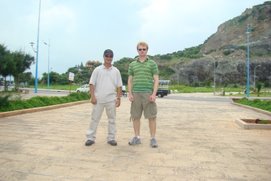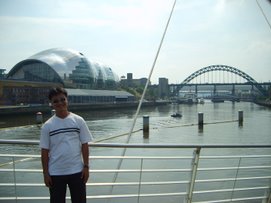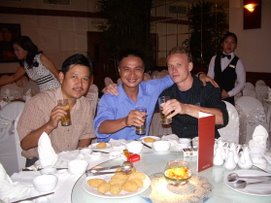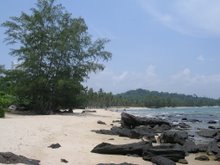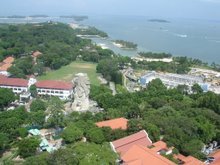
Who are the modernizers and reformers steering the region towards good business practice, transparency and management excellence?
Other publications list Asia's most influential, or its most powerful or richest, but World Business is more forward-looking than that. We have spotlighted the individuals driving Asia forward - those that are helping to bring about rules-based civil societies, or who are advancing the cause of better governance, be it in business or government. One of the greatest guarantees of freedom is the free-flow of information, debate and commentary, and so our list includes several who are integral to promoting debate where governments of the region seek to restrict it. Included are several prominent bloggers who risk their livelihoods to bring to the people of Asia commentary and opinion that is a matter of course in the West.
We have included some of the region's prominent businesspeople, notable not only for their forward-looking approach but also for their philanthropy, which remains essential in Asia where governments for the most part lack sufficient resources to do all that should be done to take care of society's most vulnerable. And there are some prominent legislators: Asia is home to some of the world's most repressive regimes, but others, such as Vietnam's current leadership, have shown a preparedness to ditch ideology in favour of improving their people's welfare.
Some of the names will invite controversy: as administrator of Tibet, Hu Jintao was responsible for a crackdown in 1989 that saw hundreds of Tibetan protestors killed; Malaysia's former prime minister Mahathir Mohamad did not use his period of power to introduce greater transparency in government tendering or stamp out corruption in Malaysia's police force; and Pushpa Kamal Dahal, better known as Prachanda, leader of the Maoists in Nepal, led a bloody decade-long war against the Nepalese government. But it is our contention that these individuals are now helping to reform Asia, so that in future the region's citizens will enjoy greater freedoms than in the past.
1. HU JINTAO, CHINA
Hu Jintao is the eighth General Secretary of the Communist Party of China, and China's paramount leader and president. The general rule of thumb has become that each new Chinese leader is less hard-line than the last and Hu bears this out. He succeeded Jiang Zemin in 2002 and to date has shown himself to be cosmopolitan, worldly and technocratic. He speaks relatively unaccented Mandarin, unlike most of his predecessors, underlining his urbane image.
Hu rose through China's construction ministry, became involved in the Communist party and was introduced to a series of mentors who recognised his talent. He was appointed party chief of the Tibet Autonomous Region in 1988, where he took a hard-line politically, instigating a crackdown in 1989 that saw the deaths of several hundred Tibetan activists. But at the same time, he liberalised cultural activities. This apparently paradoxical approach sums up his style: protect the Chinese state at all costs, but increase personal freedoms.
Since becoming president, one of Hu's priorities has been the development of China's poorer inner provinces to ensure a better distribution of the country's economic advancement. Transparency in government decision-making has also increased - China's news agency now publishes Politburo standing committee meeting details, and foreign journalists enjoy unprecedented access. Emphasis on GDP growth has lessened; instead, there is more concern with the quality of growth.
China's foreign policy, particularly its cultivation of links with African and South American states, illustrates that under Hu, China is becoming more of a commercial player on the world stage and less of a political strategist for its own sake.
2. RAJA PETRA KAMARUDIN, MALAYSIA
Though more robust than that of Singapore, Malaysia's media is nonetheless tame. All significant media outlets are sympathetic to the government, there is little investigative journalism and discussion of many issues is discouraged. The newspapers focus endlessly on crime and lifestyle issues, and Malaysians tend to buy them for their job ads and to find out what's showing at the cinema. Increasingly, the serious reporting and commentary is done by bloggers, of which Raj Petra Kamarudin's www.malaysia-today.net is the best.
Petra, a nephew of a former king of Malaysia, founded Malaysia-today in 2004 and works on it full time. The site now gets an astonishing 1.8 million hits on an average day, making it much more popular than any Malaysian newspaper. Malaysia-today plays an enormously important role in its attempts to keep the government accountable. It reports on ministers' many business interests, nepotism and just about anything else that the government would prefer to keep quiet. Petra uses the site to denounce money politics, corruption and Malaysia's endless fascination with race and race-based politics. A popular, ongoing series is the Khairy Chronicles, which provides an account of the doings of the prime minister's young, unelected, but highly influential son-in-law.
Many reports have been made against Petra to the police, agents from Malaysia's Special Branch have questioned him on several occasions and his computers have been seized. Recently, he reported how the government intended to use a nominee company to borrow $50 billion, in order to avoid recording the loan as government borrowing. He has also reported on a particularly grisly murder that appeared to implicate senior government figures.
3. LOU JIWEI, CHINA
Lou Jiwei has been appointed to head the investment agency that will manage $200 billion of China's $1 trillion in foreign exchange reserves, which have accrued from inwards foreign investment and export earnings. Finance minister Jin Renqing said in March that the new agency will use "international best practices" and that "we will try to maximise profits and returns on our management of foreign exchange, guided by the principles of safety and risk management". The agency will model itself on the Singapore government's Temasek Holdings, but will be twice its size.
Educated and cosmopolitan, Lou's reputation as a moderniser precedes his appointment to the agency. He has been at the forefront of reforming China's economy for more than two decades and is a well-regarded technocrat. He spearheaded the reform of China's financial services industry during his seven-year term as vice-minister of finance. A protege of the reformist premier Zhu Rongji, Lou was pivotal in redesigning China's tax system and drawing up plans for a domestic bond market as the deputy head of the Shanghai Commission for Economic Regulation.
A computer programmer turned economist, he has always been a low-key policy specialist and perhaps represents the best hope for China's troubled Communist party. As the party's devotion to Marxist and Maoist ideology has waned, talent in running China's increasingly sophisticated economy has become more important. Unlike many of his colleagues, Lou did not join the rallies in Shanghai's People's Park in 1989 in support of the Tiananmen Square demonstrations. He prefers to use more official channels and consequently has been one of China's most effective reformers.
4. NARAYANA MURTHY, INDIA
Narayana Murthy founded global consulting and IT services giant Infosys Technologies in 1981. He and a handful of other software engineers, who saw IT outsourcing's potential, have almost single-handedly changed how the world thinks about India. In the space of one generation, the popular perception has changed from one of chronic poverty and over-population to one of technical sophistication and a country on the move. Of course, the reality lies somewhere in between, but this change in perception has been more important within India than outside, giving Indians a new confidence. Importantly, it has shown that India can compete on the world economic stage in a sector not assisted by government or hidden behind tariffs.
Murthy served as Infosys chairman for 20 years until 2002, and as executive chairman of the board and chief mentor from 2002 to 2006. The company expects revenues of more than $3 billion this year. He has been prominent in the fight in India for better corporate governance and was appointed chairman of the Securities & Exchange Board of India's Committee on Corporate Governance in 2003,
He is a member of the advisory board of Harvard Business School's Corporate Governance initiative. He is also on the board of directors of INSEAD and is an independent director of DBS, Singapore's largest bank. In March, he became chairman of the Asia Business Council, and he joins Unilever's board this month as a non-executive director. He has been the recipient of numerous awards and honours, and in December 2005 was voted the seventh most admired CEO/chairman in a global study by the Economist Intelligence Unit. In March, he denied that he was interested in running for the presidency of India.
5. NGUYEN TAN DUNG, VIETNAM
Nguyen Tan Dung was appointed prime minister of Vietnam in June 2006 after the retirement of his predecessor, Phan Van Khai. At 57, he is the first Vietnamese communist leader to be born after the August Revolution in 1945 and is Vietnam's youngest prime minister. Like Khai, he is a reformer and a moderniser; he was appointed to carry on the economic reforms that have seen the economy grow at about 7% a year and permitted the country's admission to the WTO in 2006.
Dung is a technocrat and is economically literate, but he is not the only moderniser in the government. Nguyen Minh Triet, who was appointed president when Dung was appointed prime minister, is also a reformer. And the third member of the power triumvirate, communist party chief Nong Duc Manh, is another keen moderniser with a strong preference for privatising state-owned assets.
Dung was appointed one of five deputy prime ministers in 1997; a year later he was also made governor of Vietnam's central bank, the State Bank of Vietnam, where he pushed forward monetary reform and bank mergers, thus giving the country's financial system a more stable foundation. On becoming prime minister, he nominated fighting corruption and developing the Vietnamese economy in a sustainable way as two of his priorities. On one of his first overseas trips as prime minister, Dung met the Pope at the Vatican in January, the first Vietnamese leader to do so.
Dung is overseeing Vietnam's progress from a communist state to a more market-oriented country that is an active and mature participant on the world stage. He is firmly committed to carrying on the legacy of his recent predecessors - that of further openness and economic freedom.
6. MUHAMMAD YUNUS, BANGLADESH
Born in 1940, Muhammad Yunus is the founder of Grameen Bank, which provides micro-credit loans to poor, would-be entrepreneurs who would otherwise be denied credit by the formal banking system. For his efforts, he and the bank were jointly awarded the Nobel Peace Prize in 2006. Yunus is also the recipient of the Ramon Magsaysay Award, the World Food Prize and the Sydney Peace Prize.
Yunus graduated in economics from Dhaka University, later obtaining a PhD in economics from Vanderbilt University. He first became interested in what later became known as micro-credit during the 1974 Bangladesh famine. His first loan - from his own pocket - was for $27 to a woman who made bamboo furniture. He soon realised that very small loans could make a big difference to poor people who want to start or expand a small business.
In 1976, the Grameen Bank started to make loans to poor Bangladeshis. It has since lent more than $5.1 billion to 5.3 million borrowers. More than 96% of loans are to women: they are more impoverished and have also proven to be more diligent repayers than men. Repayment is encouraged by lending to informal groups whose members act as co-guarantors. The success of the Grameen model has inspired similar efforts throughout the developing world and there are now micro-credit institutions in more than 23 countries.
Yunus announced in February that public pressure to intervene in Bangladesh's violent and complex political arena had forced his decision to set up a new political party. The country has been ruled by a military-backed administration since 11 January, when the president declared a state of emergency and cancelled parliamentary elections.
7. MAHATHIR MOHAMAD, MALAYSIA
Mahathir Mohamad, Malaysia's prime minister from 1981 to 2003, was perhaps Asia's most misunderstood leader. Mahathir had plenty of critics, but the country's impressive development under his stewardship is undeniable. Also undeniable is his popularity among Malaysia's minority ethnic groups, particularly the Chinese, who comprise about 30% of the population. Mahathir managed to persuade different ethnic groups to think of themselves as Malaysians, despite economic and education policies that favoured the majority Malay population at the expense of the commercially successful Chinese minority.
These policies helped to break the nexus between great wealth and (Chinese) ethnicity, thus making the Chinese less of a target politically in the event of unrest. Mahathir also kept a lid on Islamic fundamentalism, showing not just Malaysia but much of the Islamic world that economic progress and Islam can go hand in hand. Under Mahathir, the media and the judiciary lacked independence, but Malaysians enjoy far more political freedoms than the citizens of neighbouring Singapore.
Mahathir resigned as prime minister while still popular and at a time of his choosing. In retirement, he has emerged as a loud critic of the new administration, bringing to Malaysia a level of public debate that few would have thought possible. His regular interventions on policy issues have almost given Malaysia the strong opposition voice that it has not previously had.
He has attacked the government for not doing enough to tackle the widespread corruption, and has criticised the concessions given to foreign firms that invest in an economic zone in southern Malaysia. Even out of office, Mahathir continues to modernise his country.
8. LI KA SHING, HONG KONG
Sir Li Ka Shing has broken the mould. When most ethnic Chinese become big in business, it usually means they simply become even bigger traders of goods. But not Li. An immigrant from mainland China, he had his start making and selling plastic flowers. As he became more successful, he moved increasingly into providing services, albeit with infrastructure development - specifically, providing port services in Hong Kong, mainland China, India and elsewhere, and more recently becoming a worldwide force in telecommunications services.
By moving beyond the old cultural stereotype, Li has transformed his group of companies into one of Asia's first home-grown genuine multinationals. He is admired around the world rather than merely in Hong Kong as an astute investor, and along the way has made himself the world's ninth richest individual, with an estimated fortune of $23 billion. But he does not lead an extravagant lifestyle: the main indicator of his wealth and status is that he's rarely seen without a large contingent of bodyguards.
Cheung Kong Holdings emerged in the early 1970s; today, the group operates in 54 countries and employs 220,000 people. In 1979, Li acquired Hutchison Whampoa, which became the vehicle for his electricity generation, ports and telecommunications interests. Li was an early investor in telecoms group Orange, before selling out to Germany's Mannesmann Group in 2001 for a profit of more than $15 billion. In January 2007 Hutchison agreed to sell its 67% stake in Indian mobile phone operator Hutchison Essar to Vodafone for $9 billion.
Li has established the Li Ka Shing Foundation for charitable works and is a major donor to education and healthcare - he is believed to have given away more than $1 billion to date.
9. JAIME AUGUSTO ZOBEL DE AYALA, PHILIPPINES
Jaime Augusto Zobel de Ayala is the head of the influential Ayala Group, one of the Philippines' biggest business groups. Zobel studied economics at Harvard and has an MBA from Harvard. He is an intellectual, has a truly global outlook and is a strong promoter of the principles of corporate governance in a country that sorely needs them.
Ayala has interests in real estate, water supply, automobile distribution, banking and food production, and has a reputation for being prudent and conservative. Zobel serves as chairman of the family holding company, Ayala Corporation, the group's mobile telephone operator Globe Telecom and the Bank of the Philippine Islands. He is also co-vice chairman of the Ayala Foundation, a leading corporate donor in the Philippines. The foundation has a US-based arm that encourages Filipinos to contribute to social development programmes in the Philippines.
The family's sound management practice is exemplary by Asian standards. It does not have private business interests that run parallel with its listed companies, and so it is free of the conflicts of interests that bedevil many Asian family-controlled conglomerates. All Ayala businesses are listed or belong to a parent company that is.
The family is of Spanish descent, but under Zobel it has moved to open its management ranks to Filipinos of any ethnicity. Family members are involved in the group's management only if they have the requisite professional skills. The group has raised its accounting practices to international standards, ahead of that mandated by the Securities & Exchange Commission and the Philippine GAAP.
10. SYED MOKHTAR AL-BUKHARY, MALAYSIA
Syed Mokhtar Al-Bukhary has built himself up from almost nothing to be one of Malaysia's richest men. He has developed port facilities and an airport in southern Malaysia, as well as amassing interests in property, hotels, power stations, rubber plantations, banking, retailing and construction. His companies are run by professional managers throughout, rather than family members.
He dislikes publicity and is remarkable by Malaysian corporate standards in not using his shareholders' money to buy a corporate jet, a helicopter or a fleet of Mercedes-Benz. He has no interest in personal aggrandisement. Instead, his great passion is his charitable foundation, the Al-Bukhary Foundation, into which he has poured millions to build mosques, schools and hospitals. The foundation has also built, stocked and runs the Islamic Art Museum in Kuala Lumpur, a world-class institution that puts Malaysia's National Museum to shame. A modern Muslim, he does not believe that women should cover their heads or faces and feels that Islam should return to what it was once known for: commerce and the arts.
In late 2006, his MMC Corporation, together with a local partner, won an extraordinary $30 billion infrastructure deal in Saudi Arabia to develop a new industrial and commercial city. It's a huge undertaking for any company, let alone a Malaysian one, and it represents how Al-Bukhary likes to do business. He is a strong promoter of Muslim cross-border investment and trading ties, in the same way that other commercial ethnic groups trade across borders.
Al-Bukhary is a breath of fresh air for corporate Malaysia and an inspiration to Muslims everywhere.
11. SUSILO BAMBANG YUDHOYONO, INDONESIA
Susilo Bambang Yudhoyono was elected president of Indonesia in 2004. To some, his presidency has been disappointing, but then it could barely be anything else. Indonesia's problems are so enormous and intractable that the job is near-impossible. So why is Yudhoyono one of Asia's top progressives? Largely because of what he's not: he is not corrupt, prone to nepotism, administratively incompetent or an obsessive nationalist.
He has enormous personal integrity and has done a remarkable job in balancing Indonesia's many conflicting interests in this the world's largest Islamic country, but also one of its most ethnically diverse. A retired general, he is Indonesia's sixth president but the first to have been elected directly by voters. He is an English speaker, in contrast with his immediate predecessor Megawati Soekarnoputri, a Jakarta housewife whose only political attribute was that her father had been president. Unlike other senior politicians' children, Yudhoyono's two sons are not in business. Each of ex-president Soeharto's six children started one or more conglomerates, all dependent on government favours and concessions.
Yudhoyono earned a reputation as one of the army's pro-reform officers in the last days of Soeharto's regime. In the aftermath of Soeharto's fall in 1998, Yudhoyono talked publicly about his ideas for reforming the role of the military and Indonesia more generally. His popularity rose, and he was made co-ordinating minister for politics and security. One of his first tasks was to remove the army from political life.
Yudhoyono's time as president has been plagued by natural disasters, including the 2004 tsunami. Nonetheless, he has negotiated a peace settlement with rebels in the province of Aceh, and cut fuel subsidies twice in 2005.
12. RATAN TATA, INDIA
Ratan Tata is India's most progressive businessman on several counts: he has expanded a family business into a well-run international conglomerate and has done so largely on behalf of charity - the principal owners of the Tata Group are a series of charities. The family's activities (it has given millions to research, environment projects and schools), like those of the rest of India's small Parsee community of which Tata is a member, have made it well-liked and admired, despite its wealth and ethnic minority status. The Parsees provide a valuable lesson to other rich business minorities on how to avoid persecution from an envious majority.
Tata joined the family business after graduating in architecture and structural engineering from Cornell University in 1962. In 1991, he took over as group chairman, ushering in a period of management rationalisation and greater investment in core activities that have allowed the group to expand to its current size - Tata Group has the largest capitalisation on the Mumbai stock exchange. The group bought Tetley Tea in 2000 for $421 million, the truck division of South Korea's Daewoo for $102 million in 2004 and, in January, Europe's Corus steel-making group for a massive $11.3 billion. Under Tata, the group has been at the forefront of India's push to become the world's biggest exporter of IT services.
Tata is on the board of India's central bank and is a member of the Prime Minister's Council on Trade and Industry. Among his other public and charitable roles, he also serves on the programme board of the Bill & Melinda Gates Foundation's India AIDS initiative. Tata has shown India that its companies can be world class, and he is arguably the country's most important philanthropist.
13. WARREN LICHTENSTEIN, JAPAN/KOREA
A US citizen, Warren Lichtenstein is an activist investor and founder of Steel Partners, a New York-based hedge fund. The fund has stakes in more than 100 companies in the US, Japan and Korea. Lichtenstein is a demanding minority investor, who exercises shareholder rights to enforce disclosure and accountability from the companies in which he invests. Accordingly, he has been something of a shock to corporate Japan and Korea, in which minority shareholders are expected to know their place.
In Japan, many listed companies hold their AGMs on the same day to limit the number of meetings that investors in multiple companies can attend. Many companies have little interest in shareholder value and build up huge cash piles with no intention of returning funds to shareholders. This, and other sluggish practices, damages the reputation of the stock market and hinders the flow of new capital.
Lichtenstein targets cash-rich firms with market capitalisations well below net asset values, builds up a stake in them and then threatens a takeover unless they return their cash to shareholders. His targeting of several Japanese companies in 2003 impelled the boards of dozens of unrelated Japanese companies to pre-emptively increase their dividend payouts. In Korea, Lichtenstein teamed up with fellow fund manager Carl Icahn to launch a hostile takeover bid for South Korea's biggest tobacco company, KT&G. Hostile takeovers are almost unheard of in Korea and the move created an uproar, but KT&G agreed to return $2.9 billion to shareholders.
Lichtenstein's method of doing business has made him immensely wealthy, but he has also dramatically changed the behaviour of Japanese and Korean companies.
14. MAHESH, AJAY AND SHARAD AMALEAN, SRI LANKA
A Sri Lankan-based intimate apparel maker, the three Amalean brothers founded MAS Holdings in 1986. It is the largest supplier to Victoria's Secret and other customers include Gap, Marks & Spencer, Tesco and Reebok. In March 2007, MAS announced plans to launch its own brand this August.
The company has 17 plants in eight countries and 35,000 employees. But what's remarkable about it is its home-grown corporate social responsibility (CSR) programme. Women comprise more than 90% of MAS' employees and so the company established the Women Go Beyond programme to educate and empower its employees. A beauty, health and hygiene certificate is offered, and there are classes on reproductive health, domestic violence and traditional crafts. Nearby schools and hospitals are funded and scholarships are awarded.
MAS set up its plants in rural locations near villages so that women would not have to leave their families to find work, and all employees must be aged at least 18 (in contrast, Chinese factories can take on employees as young as 14). The company also invests in developing clear career paths: its Ready to Unleash programme aims to guide graduates into the company and on to management levels.
MAS has faced intense competition from China. The international Multi-Fibre Agreement, which ended in 2005, ensured that at least some of the West's clothing and textiles were sourced from smaller developing countries. Since then, the Amaleans have shown that it is possible to compete with sweatshops in China by emphasising their CSR programme, which has made MAS a more attractive source for retailers with ethical buying policies.
15. JARUVAN MAINTAKA, THAILAND
Born in 1947, Jaruvan Maintak is Thailand's auditor general and an iconic figure. A Catholic convert, she graduated from Thailand's Chulalongkorn University and later completed an MBA at Michigan State University. She joined the office of the auditor general and in 2001 was appointed by the Thai Senate to be the auditor general. The manner of the appointment was controversial, however, and she did not appear to be then prime minister Thaksin Shinawatra's first choice for the position.
Jaruvan embarked on a series of investigations that embarrassed the government and a legal challenge was made to her appointment, which was upheld. Many interpreted this move as an attempt to silence her rather than concerns about due process. She refused to step down, saying she would do so only if the king assented. The king withheld his assent, thus embarrassing Thaksin and his government.
The military coup in September 2006, which had the implicit backing of the king, abrogated the 1997 constitution and most of the state organisations it established. The auditor general's office was spared, however, and the new military government confirmed Jaruvan in her position.
The government made Jaruvan a member of its newly established Assets Examination Committee (AEC), tasked with investigating corruption involving projects approved by Thaksin's government. Jaruvan threatened to resign if its scope was not expanded to include all cases of alleged irregularity, including the personal wealth of former cabinet ministers.
The AEC has since commenced several high-profile investigations and Jaruvan has shown no fear. Her dogged determination has attracted many enemies, but she has set new standards of accountability in Thailand.
16. LEE KIN MUN (ALIAS MR BROWN), SINGAPORE
Singapore has some of the world's tightest media restrictions. Little genuine public debate is permitted and investigative journalism is largely non-existent. The role of the media is to report government announcements rather than to hold the government to account. And so Singaporeans are fed a bland diet of lifestyle articles, world news often slanted to show Singapore in a good light by way of comparison, and news about government policy. Not surprisingly, Singapore has one of the world's most active blogging communities. Genuine debate, opinion pieces and news appear on many Singapore-related websites.
Lee Kin Mun has become one of Singapore's most widely read and influential bloggers through his social and political commentary website, www.mrbrown.com. Lee also produces a satirical podcast called the Mr Brown Show, which averages 20,000 downloads a day. It is sophisticated and hugely funny - and a stark contrast to what is available on local government-controlled television.
Such is the popularity of Lee's blog that he was given a column in the government-controlled Today newspaper in a measure designed to demonstrate that the government could tolerate a measure of public debate. However, the experiment ended abruptly after Li wrote a column on rising living costs. A government official complained that Lee had distorted the truth and Singapore's prime minister claimed that Lee had made wild accusations.
Lee continues to publish and broadcast his satires and commentaries, providing Singaporeans with a vibrant and diversified media otherwise denied them.
17. ZETI AKHTAR AZIZ, MALAYSIA
The assertive and competent Zeti Akhtar Aziz was appointed governor of Malaysia's central bank in 2000. Her appointment demonstrated to the world that being a Muslim woman in an Islamic country was not incompatible with either holding a position of real power or with south-east Asian traditions. She had held previous positions with the bank, including deputy governor, chief economist and head of the economics department.
Zeti was instrumental in advising the government to unpeg the Malaysian ringgit from the US dollar, as she had been in advising the government about implementing the peg in the first place. Many might have disagreed with the government's decision to peg the ringgit in 1998 during Asia's economic crisis, but few could argue with the competency with which it was carried out - Malaysia's central bank is one of Asia's most technically able and least corrupt.
Zeti has been prominent in the development of Islamic finance in Malaysia and internationally, such that the country is emerging as an important centre for Islamic finance, both in its practice and in developing the regulatory framework to support it. She studied economics at the University of Malaya, obtained her PhD from the University of Pennsylvania, and is published in the areas of monetary and financial economics, capital flows and macroeconomic management.
18. TARISA WATANAGASE, THAILAND
Tarisa Watanagase, the first female governor of the Bank of Thailand, the country's central bank, was appointed to the post in October 2006; she also sits on the seven-member monetary policy board that sets interest rates in Thailand. She has been with the bank for 31 years (with a break at the IMF from 1988 to 1990) and is widely respected in the finance community not only for her technical skills, but also for her reputation as a fighter for central bank independence.
The attempts of previous prime minister Thaksin Shinawatra to undermine the independence of most key state institutions was one of the contributing factors in the military moving against him in September 2006. The interim military-backed government's appointment of Tarisa to head the central bank was a signal that it intended to adopt a hands-off approach. Similarly, it opted to reinstate the auditor general, who Thaksin had sought to remove, for similar reasons (see Jaruvan Maintaka).
Born in 1949, Tarisa gained a PhD in economics from Washington University. She joined the bank in 1975 and has had experience in each key division. Before her appointment to governor, she had been one of the bank's three deputy governors and another woman, Atchana Waiquamdee, was appointed to fill the vacancy created by Tarisa's appointment. The pair provide clear evidence of the prominent role that women are able to play in Asia.
19. DAVID WEBB, HONG KONG
David Webb runs one of the best websites devoted to corporate governance among listed companies anywhere - see www.webb-site.com. His commentaries on the misdeeds of many of Hong Kong's listed companies are exceptionally well written, and are devastating in their forensic and careful analysis. Unfair related-party transactions between listed and privately held companies are a particular target of his; a recent post, for example, looks at Chinese oil company CNOOC's attempt to force minority shareholders to approve more loans to a finance company set up by its state-owned parent.
Still relatively young, Webb is a former investment banker who moved to Hong Kong from London in 1991. He was corporate finance director of Barclays subsidiary BZW Asia, conducting equity issues and advisory mandates throughout Asia, until 1994, when he became in-house adviser to Wheelock, a local listed conglomerate, before retiring in 1998.
He made a small fortune from savvy stock investing and has devoted much of his time since to non-profit corporate governance advocacy work, most notably through his website, which has attracted a following among the investment community. He has become widely quoted on corporate governance issues in the Hong Kong and regional media. He holds small stakes in many companies in order to attend AGMs and hold directors accountable.
He was elected a non-executive director of Hong Kong Exchanges & Clearing, which runs Hong Kong's stock exchange, in 2003. Some were concerned that this would compromise his independence, but his withering and typically humiliating website commentaries have continued.
20. PUSHPA KAMAL DAHAL (ALIAS PRACHANDA), NEPAL
Pushpa Kamal Dahal, aka Prachanda, is the leader of the Maoist Communist party of Nepal. Born into a Brahmin family in 1954, he studied agricultural science at a Nepalese university and was inspired by China's Cultural Revolution in the 1970s to become active in the communist movement in Nepal. He became leader of the Communist party in 1986 and after it splintered he emerged as the leader of the Communist party of Nepal (Maoist) in 1994. The party gave the government a list of 40 demands and threatened to declare war if the demands were not met. Between 1996 and 2006, the Maoists waged a bloody civil war, causing enormous damage to Nepal's rudimentary infrastructure and costing about 12,000 lives. Both sides were culpable and engaged in appalling human rights abuses.
In February 2005, Nepal's king sacked the elected government and took direct control of day-to-day affairs of state. In November 2005, Prachanda and an alliance of seven parties that had been elected to Nepal's parliament in 1999 released a 12-point plan for co-operation. Key to the plan was a commitment by all sides to a multi-party democracy, press freedom and human rights. A ceasefire was agreed and, at Prachanda's urging, the government of prime minister Girija Prasad Koirala stripped almost all powers and many assets from the king, a process that has occurred with surprising speed.
Prachanda's talks with the prime minister have resulted in an agreement that the Maoists will enter a multi-party interim government, a new constitution will be drafted and both sides will disarm under international supervision. Nepal now has its first chance of peace in more than a decade and the possibility of real political reform.
Words by: Michael Backman, World Business
Published: 09-May-07









